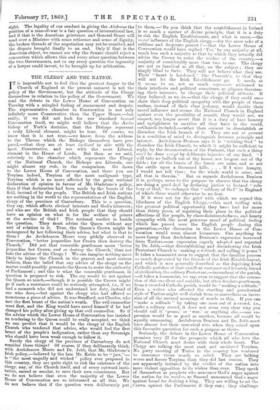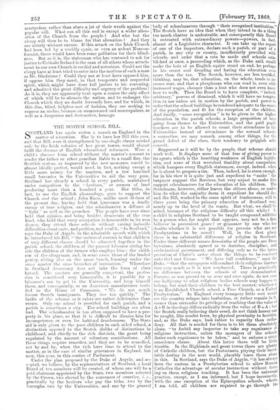THE CLERGY AND THE NATION.
TT is impossible not to feel that the greatest danger to the 1 Church of England at the present moment is not the policy of the Government, but the attitude of the Clergy themselves in relation to the policy of the Government. We read the debate in the Lower House of Convocation on Tuesday with a mingled feeling of amusement and despair.
The representative chamber in Convocation is not only infinitely more Conservative than the Upper House,—but really, if we did • not look for our standard beyond Convocation itself, we might well believe that the Archbishop of York's doctrine, that the Bishops represent a truly Liberal element, might be true. Of course, we know that it is not true,—we know, from the address to the Throne which the Bishops themselves have prepared,—that they are at least inclined to side with the most Conservative, and not with the most Liberal, element in the House of Lords. But then, as we said, relatively to the chamber which represents the Clergy of the National Church, the Bishops are Liberals, one might almost say reds, in the comparison. Go down to the Lower House of Convocation, and there you see Toryism indeed, Toryism of the most malignant type, Toryism which is no more affected by the great national declaration of opinion in favour of Mr. Gladstone's policy, than if that declaration had been made by the beasts of the field, instead of by the people. The British and Irish nations are nothing in the world to the representatives of the English clergy of the province of Canterbury. This is a question, they say, which affects clerical interests and God's interests ; and who are the British and Irish people that they should have an opinion on what is for the welfare of priests or the service of God ? The national verdict is beside the question. They *lust advise the Queen without any sort of relation to it. True, the Queen's Crown might be endangered by her following their advice, but what is that to them ? As Archdeacon Moore very pithily observed in Convocation, "better jeopardize her Crown than destroy the Church." Did not that venerable gentleman mean 'better jeopardize her Crown, and so destroy the Church,' than not take the advice of the Clergy We can imagine nothing more likely to injure the Church in the gravest and most serious fashion, than the belief that any advice of the clergy on the matter could possibly persuade the Queen to resist the authority of Parliament ; and this is what the venerable gentleman in question is prepared to risk. The cry would be not against the Queen so much,—though it is possible the Crown might go if such a resistance could be seriously attempted, i.e., if we had a monarch who did not understand her duty, instead of one who does,—but against the clergy who had offered so monstrous a piece of advice. It was Strafford, not Charles, who met the first brunt of the nation's wrath. The evil counsellor went first, and the King would have saved himself if he had changed his policy after giving up that evil counsellor. So if the advice which the Lower House of Convocation has insisted on tendering to the Qaeen could be really accepted, we think we can predict that it would be the clergy of the English Church who tendered that advice, who would feel the first brunt of the people's indignation, rather than any Sovereign who should have been weak enough to follow it. Surely the clergy of the province of Canterbury do not consider these things? Of course, if they deliberately think, with Archdeacon Moore and Dr. Jebb, that Mr. Gladstone's Irish policy,—believed by the late Mr. Keble to be " just,"— is
" the most ungodly and wicked " policy ever proposed in this country, they are quite right to risk the existence of the clergy, nay, of the Church itself, and of every outward institution, sacred or secular, to save their own consciences. But we do not believe that even the majority of the Lower House of Convocation are so infatuated as all this. We do not believe that if the question were deliberately put to them,---'Do you think that the establishment in Ireland is so much a matter of divine principle, that it is a duty to risk the English Establishment, and what is more,—the moral influence of the English clergy,—for the mere sake of a sublime and desperate protest ?'—that the Lower House of Convocation would have replied Yes,' by any majority at all, much less such a majority as that by which they actually did advise the Crown to resist the verdict of the country,—a majority of considerably more than two to one. The clergy are not so fanatical as all that, on the subject ; they are simply blind to facts. They will not believe what they see. Their " heart is hardened," like Pharaoh's, so that they will not let the Irish Establishment go. It needs, as it seems to us, not so much arguments addressed to their intellects and political conscience, as plagues threatening their interests, to change their political attitude. If they believed, as we do,—that the clergy, if they could once show their deep political sympathy with the people of these realms, instead of their class jealousy, would double their moral influence and secure the National Church in England against even the possibility of assault, they would not, we suspect, any longer assert that it is a duty of bare honesty and uprightness to sacrifice all they have in the world, —Church included,—rather than consent to disestablish or disendow the Irish branch of it.. They are not at present in a condition of mind to distinguish between principle and interest. Archdeacon Denison says it is "robbing God " to disendow the Irish Church, to which it might be sufficient to reply, by the demonstration of the Psalmist, that such a thing can't be done e.cctpt by deliberate injustice of any kind. " I will take no bullock out of thy house, nor he-goat out of thy folds ; for all the beasts of the forest are mine, and so are the cattle upon a thousand hills. . . . If I were hungry, I would not tell thee ; for the whole world is mine, and all that is therein." But as regards Archdeacon Denison it is. perhaps, more to the purpose to observe that the clergy are doing a good deal by declaring justice to Ireland " robbery of God," to endanger that "robbery of God" in England of which there would otherwise be no fear.
If it were not for the grief with which we regard this blindness of the English Clergy,—this mad trifling with the greatest political opportunity they have had for more than thirty years, of regaining their place in the political affections of the people, by class-disinterestedness, and hearty sympathy with the most generous mood of political feeling which has passed over the English people during this generation,—the discussion in the Lower House of Convocation would seem almost humorous. Can anything be more funny than Archdeacon Denison's expression borrowed from Tacitus,—an expression eagerly adopted and repeated by Dr. Jebb,—that disestablishing and disendowing the Irish Protestant Church is ' making a solitude, and calling it peace '? It takes a humourist even to suggest that the familiar process so much deprecated by the friends of the Irish Establishment, and which is now generally described as the depriving Irish Catholic parishes of that excellent customer and leisurely friend of civilization, the solitary Protestant,—incumbent of the parish, —it takes a humourist, we say, even to suggest that the extraction of this excellent and amiable, but often desolate gentleman, from a crowded Catholic parish, would be " making a solitude." Even a writer who affected the startling and paradoxical style of Tacitus might well shrink from so marvellous an inversion of all the natural meanings of words as this. If you can "make a solitude" by taking one man out of a crowd, i.e., make a solitary crowd, it does not seem very clear why you should call it peace,' or war,' or anything else,—one expression would be as good as another, because all would he equally unmeaning. Archdeacon Denison and Dr. Jebb must have almost lost their oratorical wits when they seized upon this favourite quotation for such a purpose as theirs.
Seriously, the debate in the Lower House of Convocation promises very ill for the prospects which all who love the National Church must desire with their whole heart. The Clergy are talking the most rank and undiluted Toryism. No party meeting of Tories in the country has ventured
to announce views nearly so rabid. They are talking
worse and fiercer Toryism than they did last session. They are apparently irritated by the verdict of the nation into more violent opposition to its wishes than ever. They speak of themselves as prophets who announce God's anger against the nation for its resolve, as Samuel announced God's anger against Israel for desiring a king. They are willing to set the Crown against the Parliament if they can ; they challenge martyrdom rather than abate a jot of their wrath against the popular will. What can all this end in except a wider alienation of the Church from the people ? And who but the clergy will then be to blame for that alienation ? And they are utterly without excuse. If this attack on the Irish Church had been led by a worldly cynic, or even an ardent Nonconformist, there would have been some palliation for their blindness. But as it is, the statesman who has ventured to ask for justice to Catholic Ireland is the man of all others whose attachment to our own Church is cordial and notorious. Could not the clergy have at least tried to enter into the motives of such a man as Mr. Gladstone ? Could they not at least have opposed him, if oppose him they must, in that temperate and respectful spirit, which might have done full justice to his reasoning, and admitted the great difficulty and urgency of the problem ? As it is, they are apparently bent upon a course the only effect of which will be to alienate the nation, and to endanger the Church which they no doubt fervently love, and for which, in this dim, blind, helpless sort of fashion, they are seeking to express an undue, because an unmeasured and unscrupulous, as well as a dangerous and destructive, homage.



































 Previous page
Previous page